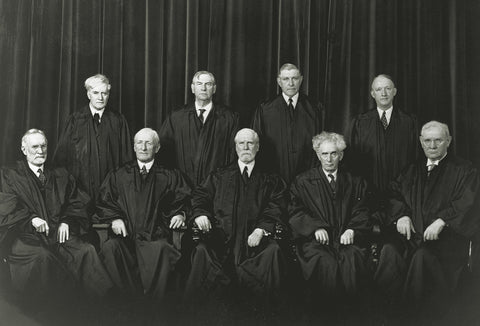
FDR’s Court Packing Scheme
At the end of his first term , the biggest threat to Franklin Roosevelt’s ambitious agenda appeared to be the U.S. Supreme Court. Beginning in 1935, the Court had overturned six of his initiatives, including the National Recovery Administration and the Agricultural Adjustment Act. Challenges to the Social Security Act, the National Labor Relations Act, and the Tennessee Valley Authority were before the Court or moving through lower courts. In his January 1937 inaugural address, with Chief Justice Charles Evans Hughes sitting a few feet away, FDR hinted at his resolve not to remain at the mercy of unelected judges who would thwart the democratically expressed will of the people.
That February 5 Roosevelt struck, sending Congress an audacious proposal that would allow him to appoint up to six new justices. That Court-reform bill—so often called by critics his “Court-packing scheme” that the phrase stuck—dominated the news into the summer of 1937. Opposition from Congressional Republicans was to be expected, but many Democrats withheld their support or cheered only tepidly.
George Gallup, who had earned his polling spurs by predicting that FDR would handily win re-election in 1936, reported that 51 percent of the public opposed the bill. The New York Times predicted that the bill “will be moved steadily to passage,” but key support was absent from the start. On the drive back to the Capitol after the president’s last-minute briefing of key members of Congress before the bill’s official debut, Rep. Hatton Sumners of Texas, Chairman of the House Judiciary Committee, said to colleagues, “Boys, here’s where I cash in my chips.” An hour later, as the proposal was being read to the Senate, Roosevelt’s vice president, conservative Texan John Nance Garner, stood in the cloakroom doorway holding his nose and turning thumbs down.
In an early March "fireside chat" Roosevelt invoked the recovery’s fragility. “We are only part-way through,” he warned. “The courts, however, have cast doubts on the ability of the elected Congress to protect us against catastrophe.” Three weeks later the Court partially undercut the bill’s rationale, unexpectedly upholding 5-4 a state minimum wage law backed by Roosevelt. Hughes wrote the ruling and, underlining its importance, read it from the bench. In April the Court upheld the National Labor Relations Act and in May the Social Security Act. Many perceived all three actions as stabs at foiling the Court-reform bill by softening the image of a Court implacably opposed to the New Deal.
this article first appeared in American history magazine
Facebook @AmericanHistoryMag | Twitter @AmericanHistMag
Conservative Justice Willis Van Devanter announced in mid-May that he would retire at term’s end. Poised to name a justice, and with the Court having backed off from undoing the New Deal in its 1936-37 term, Roosevelt could have declared victory and withdrawn his proposal. But the supreme confidence that had served him so well all his life overpowered him, and he fought on.
In stunningly vituperative language, a Senate Judiciary Committee report described his bill as “a needless, futile, and utterly dangerous abandonment of constitutional principle…. [that] would subjugate the courts to the will of Congress and the President….” The report bore the signatures of seven Democrats. New York Times columnist Arthur Krock considered the attack on Roosevelt to be an attempt by conservatives to seize control of the party as much as to defeat the bill.
In June Gallup stated that opposition to the Court bill was now 59 percent and that FDR’s favorability down from 65 to 60 percent. His standing with Congress was at its lowest ebb since he took office.
Any slim hope of salvaging the plan died in July with Senate Majority Leader Joseph Robinson of Arkansas, a well-liked conservative who supported the bill. Widely expected to be the president’s first Supreme Court nominee, Robinson succumbed to a heart attack two weeks into the Senate debate, and the bill’s opponents announced a day later that they had the votes to send the measure back to committee. Despite a 76-16 Democratic majority, the motion to send the bill into oblivion passed, 70 to 20.
In a press conference the next day, Roosevelt hid his disappointment, claiming to have achieved his goal of influencing Court decisions. But his closest advisers had seen his anger.
“He isn’t going to take his defeat lying down,” Democratic Party Chairman James Farley noted in his diary. “He has been double-crossed…by people who should have been loyal supporters.” —John A. Riggs
GET HISTORY 'S GREATEST TALES—RIGHT IN YOUR INBOX
Subscribe to our Historynet Now! newsletter for the best of the past, delivered every Wednesday.
Close
Thank you for subscribing!
Submit
